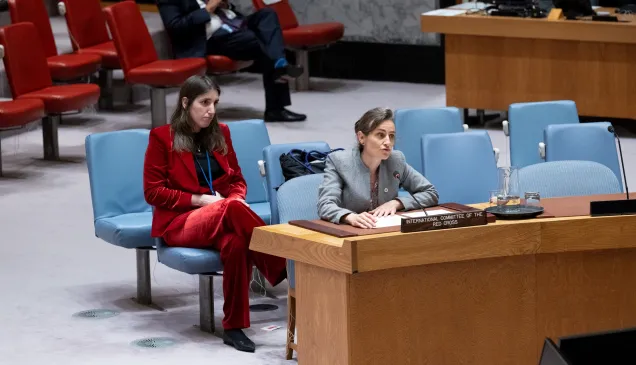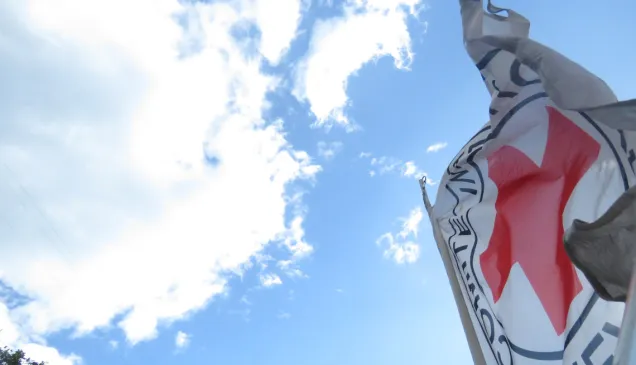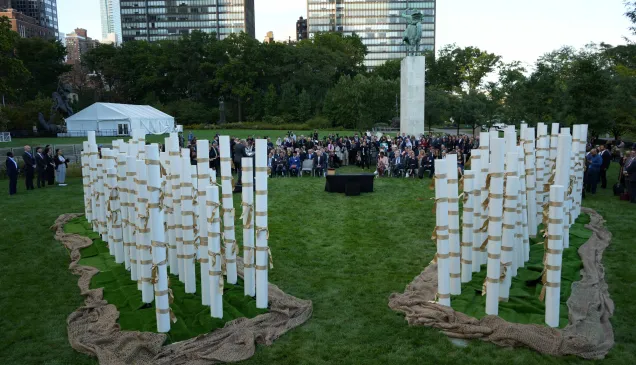Thank you.
It’s a great honour to be part of this distinguished panel and very important topic of debate.
I was asked to speak about Gaza, the West Bank, Syria, Sudan, and Yemen, where millions of civilians are trapped in a relentless cycle of violence and instability.
Our teams are on the ground; we have hundreds of staff, including 350 in Gaza. We are probably one of the remaining organizations that still has international staff on the ground.
Our surgeons operate in the field hospital around the clock, and it is devastating what they have to go through — seeing mass casualties coming in every day and operating at 200% as a standard at the moment.
But let me start with Sudan, where civilians are trapped still—and we don’t speak about this enough—in a nightmare of death, injury, and displacement. In Al Fashir, they live under an ever-tightening siege.
A surgical team at the city’s last remaining hospital describes horrific scenes of patients coming into the hospital with stomachs ruptured from shell fragments and dwindling supplies. We fear that, as the battle for control of the city intensifies, the worst is yet to come—and we should not allow this to happen.
Throughout the conflict, we have seen recurring patterns of violence against civilians and fighters who are hors de combat, not taking part in combat anymore, whenever control shifts—and we fear the same could happen soon in Al Fashir.
In Syria, tens of thousands of people are living still under the unresolved trauma of not knowing what happened to their loved ones. The ICRC alone has registered over 36,000 cases of missing people in Syria.
It is an enormous task to manage, for the authorities and everyone involved because we must assume that the real number is undoubtedly far higher. For many families, answers remain out of reach and will probably remain out of reach forever.
It should teach us a lesson, and it should be a wake-up call for what it means to give the ICRC systematic access to detention, especially when there is a legal obligation for states to do so.
The recent violence along the coast and in southern Syria is a stark reminder also of just how fragile the situation remains and how important it is to invest in peace.
And in Yemen, communities remain equally on knife’s edge as escalating hostilities threaten to ignite a wider catastrophe. Over a decade of conflict has left the country’s health care system in ruins, and many children today for example, go without vaccines and are injured without access to emergency medical care.
Critical infrastructure, which has been fragile for years, is increasingly targeted and interrupting vital services.
Now let me come to the West Bank. Relentless violence and expanding settlements are forcing Palestinians from their homes. You know that; you follow it. But what is most important, we are prevented from providing the necessary humanitarian assistance that we need to provide.
The situation is very critical for many people who do not have a possibility to return to their homes and have been displaced for months, if not longer.
But the civilians in Gaza today are being killed and deprived from access to food. And I want to be explicit: Civilians in Gaza City today are starved and forcibly displaced with nowhere to go, nowhere safe to go—there is simply no space for them to go anywhere, if they have the means to go.
We receive phone calls from people in wheelchairs who simply cannot leave their premises. Tanks are approaching even our own premises, and we do not know what will happen in the coming days.
We have not had access to Palestinian detainees for two years. I meet the families, the mothers of the hostages, myself, and I talk to them, and they are also losing hope and despairing at not seeing their children again. Human lives are sacrificed on the altar of might and military victory on both sides.
Humanitarian organisations can save lives. But parties to a conflict have to stop instrumentalizing us for military objectives. Just because you call something humanitarian does not mean that it is humane. Dropping food somewhere the most vulnerable cannot reach it is not providing humanitarian assistance.
We have to change course. Nothing will become better in the Middle East if we do not show greater respect for the rules of war.
War will always happen, but the parties have to be constrained in what is allowed to happen in war and what is not. There is human dignity and humanity to preserve, because if you lose that, we will never be able to return on a path to peace.
I thank you again for the invitation.




